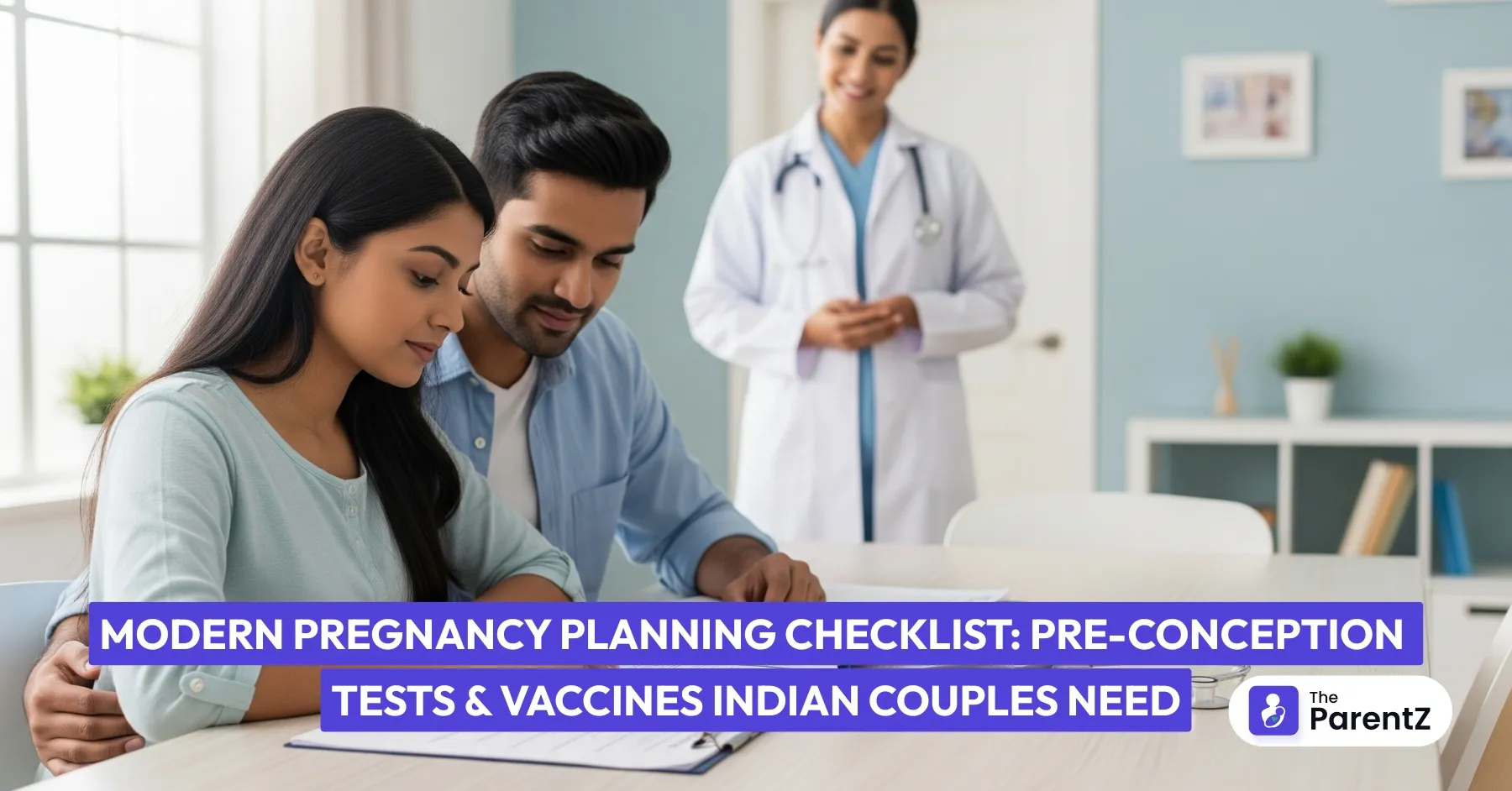Today, preparing to get pregnant is just as much about medical preparation as it is life planning. A deliberate pre-conception check lowers risks for both mother and baby, increases the chances of a healthy pregnancy, and gives couples time to correct treatable medical, infectious, genetic, or lifestyle issues before conceiving.
For Indian couples, having a clear understanding of preconception tests in India, along with the right vaccines before pregnancy, is essential to building a healthy foundation for parenthood. Here is a modern, India-oriented, evidence-based checklist to take to your OB/Gyn or family physician.
Why Pre-conception Care Matters
Pre-conception care and getting pre-conception tests in India is healthcare that is provided before pregnancy.
It’s an important step because it serves to lower the risk of complications such as miscarriage, high-risk pregnancies, congenital birth defects, and newborn illnesses. Spotting potential issues early, for instance, anemia, thyroid problems, infections, or being a carrier for an inherited condition, gives doctors time to address them before conception.
Basic things like taking folic acid, addressing anemia, updating vaccines, or treating infections can make all the difference in the lifetime health and wellness of your baby. Research has also shown that these measures are not as effective when pursued after instead of prior to conception.
Quick Checklist At a Glance
Core tests for her:
- CBC (Complete blood count): This test can determine if there is anemia or other abnormalities in the blood.
- Blood Group & Rh Typing: It is important to keep in mind to be prepared for Rh incompatibility.
- TSH (± Free T4): Reveals thyroid dysfunctions.
- Blood Glucose / HbA1c: Assesses risk of diabetes.
- Infectious Diseases: Rules out HIV, Hepatitis B, Hepatitis C, Syphilis, Rubella IgG, Varicella IgG.
- Urine (routine examination) & Urine culture in case of recurrent UTIs.
- Cervical Screening: Pap or HPV test if due.
- Hemoglobinopathy Screening: Hb electrophoresis for thalassemia or other blood disorders.
- Genetic Counselling: If there is a family or community history of risk.
Core tests for him
- Semen Analysis: Assesses fertility health.
- Infectious Diseases Testing: HIV, Hepatitis B & C, Syphilis.
- CBC and Genetic Testing: To check for family history of diseases or clinical concerns.
Vaccines to check/get before conception
- MMR (measles–mumps–rubella): If non-immune, vaccinate before conception and avoid pregnancy for at least 4 weeks (28 days) after vaccination.
- Varicella (chickenpox): If non-immune, vaccinate before conception and avoid pregnancy for 4 weeks after this live vaccine.
- Hepatitis B: If non-immune (HBsAg negative and anti-HBs <10 mIU/mL), start or complete the 3‑dose series; safe before and during pregnancy.
- Influenza (inactivated): Recommended annually; safe pre‑conception and during pregnancy, timed to the flu season.
- Tdap (tetanus–diphtheria–acellular pertussis): Ensure up‑to‑date status; for newborn protection, give one dose during 27–36 weeks in every pregnancy (even if updated pre‑pregnancy).
- HPV: Complete the series pre‑pregnancy if eligible; not given during pregnancy. If pregnancy occurs mid‑series, defer remaining doses until postpartum.
Ordering and timing: Live vaccines (MMR, varicella) must be given before pregnancy with a 4‑week wait before attempting conception; inactivated vaccines (influenza, Hep B) can be given pre‑conception or during pregnancy as indicated.
Vaccines for both partners
- MMR (measles, mumps, rubella): If non-immune, vaccinate before conception and avoid conception for 4 weeks (28 days) after vaccination.
- Varicella (chickenpox): If non-immune, vaccinate before conception and avoid pregnancy for 4 weeks after this live vaccine.
- Hepatitis B: If non-immune, start or complete the 3‑dose series; this protects both parents and the baby and is safe pre‑conception and during pregnancy.
- Influenza (flu): Give annually; safe pre‑conception and throughout pregnancy, ideally timed to the local flu season.
- Tdap (tetanus, diphtheria, pertussis): Ensure up to date; for newborn protection, give one dose during 27–36 weeks in every pregnancy.
- HPV: For eligible women prior to pregnancy; not given during pregnancy. If pregnancy occurs mid‑series, defer remaining doses until postpartum.
Blood Tests You Shouldn’t Skip
1. CBC & Hemoglobinopathy Screen
Anemia is highly prevalent among Indian women. A routine CBC test detects low levels of hemoglobin or abnormal red cells.
Furthermore, Hb electrophoresis is extremely important as the carrier rate for thalassemia and other genetic blood disorders is high in India. If one of you is a carrier, your partner should also be tested. Knowing which couples are both carriers will give them the benefits of genetic counselling and prenatal diagnostics and save both families unnecessary distress in the future.
2. Blood group & Rh typing
This preconception test in India checks your blood type and Rh factor (positive or negative). If mom is Rh negative and dad is Rh positive, Rh incompatibility poses a danger to future pregnancies. If detected early, doctors can prevent complications with anti-D injections, administered at the appropriate time.
Anti-D (Rho(D) immune globulin) is given during and after pregnancy or after sensitizing events to prevent alloimmunization. Preconception identification simply flags risk and planning.
3. Infectious disease panel (HIV, HBsAg, HCV, syphilis)
Both partners must undergo HIV, Hepatitis B & C, and Syphilis testing. Early detection of an infection enables treatment and decreases the risk that the infection will be transmitted to the baby.
For instance, if the mother is not immune to Hepatitis B, she can receive vaccination prior to getting pregnant.
4. Rubella & varicella immunity
Infection in early pregnancy can result in congenital rubella syndrome in the baby, characterized by deafness, heart disease, and intellectual disability. Also, if a pregnant woman contracts chickenpox, it could lead to serious consequences.
Immunity to rubella and varicella should be determined and vaccines administered at least 1 month before pregnancy if necessary.
5. Thyroid & glycemic screening
Even a subclinical thyroid problem can alter the course of pregnancy, leading to miscarriage, developmental delays. Likewise, uncontrolled diabetes heightens the chance of congenital abnormalities. These conditions, when diagnosed and treated prior to pregnancy, lead to safer outcomes for both mother and baby.
Genetics, Family History and Specialized Tests
If there is a family history of congenital disorders, recurrent pregnancy loss, infertility, known carrier status, or belonging to a community with a higher prevalence of specific genetic conditions, seek genetic counselling.
Options include targeted carrier screening, expanded panels, or preimplantation/prenatal diagnostic testing, depending on the risk and individual preferences. For couples from regions with high thalassemia carrier rates, screening both partners is essential.
Nutrition, Supplements, and Lifestyle (Non-negotiables)
- Folic acid: Take 400 mcg daily starting at least 1 month before conception and continue through the first trimester to reduce the risk of neural tube defects; higher doses (4–5 mg daily) are recommended only for high‑risk individuals under clinician guidance (e.g., prior NTD‑affected pregnancy, certain antiepileptics, diabetes, BMI ≥30).
- Iron: Correct iron deficiency and treat anemia as indicated; iron supports healthy maternal hemoglobin levels and pregnancy outcomes when deficiency is present.
- Multivitamin: A prenatal multivitamin can help meet micronutrient needs that may be inadequate in the usual diet; choose one that includes folic acid and iron as advised.
- Healthy weight: Maintain a healthy BMI before conception; both underweight and overweight statuses are associated with increased pregnancy risks.
- Lifestyle: Stop smoking, alcohol, and recreational drugs; limit caffeine to no more than about 200 mg per day; prioritize regular exercise and stress management.
- Medication review: Some prescription and over‑the‑counter drugs are unsafe in pregnancy; review all current medications and supplements with a clinician before attempting conception.
Practical Plan: Timeline and Talking Points For Your Clinic Visit
- 6–12 Months Prior to Pregnancy: Initiate preconception care and do full blood test, folic acid, rubella, and varicella immunity tests, vaccines updates, and carrier testing.
- 3 months before pregnancy: Correct abnormalities in test results, receive outstanding doses of any vaccine series, and ensure control of chronic conditions such as thyroid disease or diabetes.
- While pregnant: Keep taking supplements, attend antenatal appointments, including the INFLU and Tdap vaccines.
When to See a Specialist Early
- Known carrier of a genetic disorder or partner of a known carrier.
- Recurrent pregnancy loss or a history of a child with a congenital anomaly.
- Pre-existing diabetes, serious heart disease, or autoimmune disease.
- Severe obesity or underweight, or planned fertility treatment.
- Fertility treatment is being considered.
Final Thoughts
Preparing for pregnancy is a journey best shared by both partners, as each person's health plays a meaningful role in fertility and your baby's earliest development. Men's wellness, including factors like smoking, alcohol use, infections, and sperm health, can influence both conception and early pregnancy outcomes.
Consider approaching this as a partnership: scheduling a joint appointment for preconception tests in India allows you both to be fully informed and involved in the process. Bringing a printed checklist can help ensure you don't miss important topics during your visit. Ask your healthcare provider to prioritize any time-sensitive vaccinations and preconception screenings, as some require advance planning.
Your doctor will coordinate testing and vaccinations based on your health history, current wellness, and regional considerations. This preparation phase is an investment in your future family's health, strengthening your chances of a healthy pregnancy and your partnership in parenthood.
To deepen your understanding of health considerations that may affect your future child, we invite you to explore TheParentZ.com, where you'll discover thoughtful insights on childhood diseases and comprehensive resources covering parenting guidance, family wellness, and child development. Additionally, consider downloading TheParentZ App, a thoughtfully designed companion that makes monitoring your child's health simple and organized, supporting you through every stage of your parenting journey.
Medical Disclaimer: This information is for educational purposes only and is not a substitute for professional medical advice, diagnosis, or treatment. Always consult a qualified health provider with any questions about a medical condition.
References:
- https://www.fogsi.org/wp-content/uploads/2016/09/FOGSI-PCCR-Guideline-Booklet-Orange.pdffogsi
- https://www.fogsi.org/wp-content/uploads/2024/08/Binder_Vaccination-in-Women.pdffogsi
- https://nhm.gov.in/images/pdf/programmes/RBSK/Resource_Documents/Guidelines_on_Hemoglobinopathies_in%20India.pdfnhm
- https://www.cdc.gov/vaccines-pregnancy/hcp/vaccination-guidelines/index.htmlcdc
- https://obgyn.onlinelibrary.wiley.com/doi/10.1002/ijgo.15446obgyn.onlinelibrary.wiley
- https://www.who.int/tools/elena/interventions/folate-periconceptionalwho





Be the first one to comment on this story.